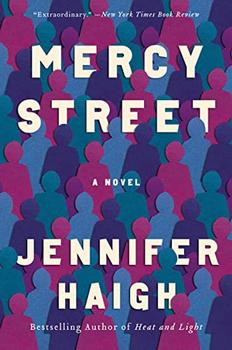Summary | Excerpt | Reviews | Beyond the Book | Readalikes | Genres & Themes | Author Bio

A Novel
by Jennifer Haigh
"Those fuckers," Mary said, meaning the priests. "Anything to change the subject."
The subject, in her mind, was unchangeable: the child victims, the Archdiocesan cover-up, hundreds of lawsuits settled in secret. There was only one subject, and Mary would not be distracted. Her convictions were solid and unyielding. Each year on Ash Wednesday, she did patient intakes—height, weight, blood pressure—with a smudge of holy soot on her forehead. How or whether she explained this to the patients, Claudia had no idea. It was a lesson you learned over and over again, doing this work: people live with contradictions.
HAILMaryfullofgracetheLordiswithThee. Mary Fahey had heard these words from earliest childhood, her own name offered to the heavens in prayer.
Was that weird? Claudia asked her once.
I never thought about it, Mary said.
THE PROTESTORS WERE A FACT OF LIFE, A DAILY NUISANCE LIKE traffic or bad weather. Some days there was only one, an old guy in a Sox cap. Claudia had given him a nickname, Puffy. He arrived each morning like a dutiful employee, in a down coat the color of trash bags. In May he'd swap it for a yellow windbreaker. To Claudia it was like the daffodils sprouting, the first rumor of spring.
In the beginning she tried talking with them. She had no experience with religious people and was surprised, actually surprised, at the way every conversation devolved into godtalk. It was like arguing a point of fact with a stubborn child who parrots a single refrain: Because my dad said so! To which a reasonable adult might respond:
He said that? What were his exact words? Are you sure you heard him right?
Or:
I've never seen your dad. Are you sure you have one?
Or:
Who asked him? Seriously, your dad needs to mind his own.
Her attempts at rational discourse went badly. On her very first day of work, a man approached her on the sidewalk—a stocky guy in Dockers and a fleece jacket, the most ordinary-looking person imaginable.
"Please, Mother," he said.
She can still recall his lilting voice, so gentle it seemed sinister. Also, it was the first time a grown stranger had called her Mother, which isn't something you forget.
"Please, Mother. Our Lord Jesus Christ is speaking to you. Please don't kill your baby."
He had been to Starbucks. She could smell it on his jacket.
"I work here," she said.
The change in his demeanor was immediate, like an actor breaking character. He looked at her as though he'd stepped in shit.
"You are doing the devil's work," he said.
Claudia said, "So I've been told."
When he called her a cunt and damned her to eternal hell, the damnation didn't faze her; as a nonbeliever, she found it slightly comical. The name-calling was more disturbing. Not so much the word itself as the way he said it: triumphantly, as though winning an argument. For a certain type of man, cunt was a concealed weapon—discreet, portable, always at the ready. What did it mean to him, this angry stranger who didn't possess (and had possibly never seen) the body part it referred to? A body part he considered loathsome, the vilest thing a person could possibly be.
It was just a word; Claudia knew this. In Britain and Ireland, cunt was used casually, recreationally—a good-natured insult between mates who, go figure, were usually men. She had learned this years before, in the early days of online dating, from a Tufts professor of English literature. At a noisy pub a few blocks from campus, he explained that cunt was a synecdoche, a figure of speech in which a part stood in for the whole. ("Like a head of cattle, " he added helpfully.) Then he delivered a discourse on synecdoche and metonymy, which weren't the same thing but were somehow related. Professing this took quite a while, and required him to use the word cunt several times. He seemed not to understand, or maybe he did, that to the female ear, cunt is brutal, exquisitely personal—half of humanity reduced to a body part, a single purpose: This is what you are. This is all you are.
Excerpted from Mercy Street by Jennifer Haigh. Copyright © 2022 by Jennifer Haigh. Excerpted by permission of Ecco. All rights reserved. No part of this excerpt may be reproduced or reprinted without permission in writing from the publisher.




If you want to build a ship, don't drum up people... but rather teach them to long for the endless immensity of the...
Click Here to find out who said this, as well as discovering other famous literary quotes!
Your guide toexceptional books
BookBrowse seeks out and recommends the best in contemporary fiction and nonfiction—books that not only engage and entertain but also deepen our understanding of ourselves and the world around us.